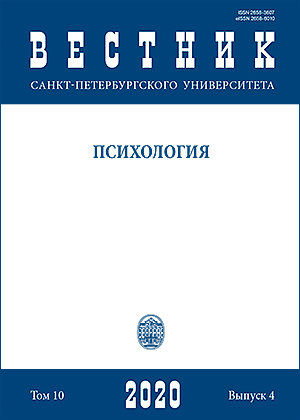Subjective life quality, psychological well-being and attitude to the time perspective as well as age among pensioners leading different lifestyles
DOI:
https://doi.org/10.21638/spbu16.2020.401Abstract
The article deals with the subjective assessment peculiarities of psychological and physical health components as indicators of life quality in correlation with psychological well-being, time perspective and subjective age in the late ontogenesis stage (58–93 years). The analysis of general patterns was carried out by age groups: 58–64, 65–74 and 75–93 years old, as well as lifestyle: elderly non-working people who receive home-based social services and elderly non-working people which lead an active lifestyle. It is shown that subjective indicators of life quality are at a rather low level and they decrease with age. However, the level of overall psychological well-being and its components correspond to a high and medium interval. The prevailing time orientations are “Positive past” and “Future” (the nearest time perspective); a balanced time perspective was found in a third of respondents. In assessing subjective age, there is a positive illusion which consists of perceiving oneself as being younger than the chronological age. An active lifestyle contributes to maintaining higher assessments of life quality level, orientation towards the future and a positive illusion of assessing subjective age. It is observed that people living with relatives or a caregiver, in comparison with those living alone, have a higher level of life quality and higher scores on the “Positive relationships with others” indicator of “Psychological well-being scale”. The period of 64–75 years is characterized by higher indicators of life quality, psychological well-being and the predominance of a balanced time perspective. Among the studied factors, psychological well-being is most closely correlated with the self-assessment of health (physical and psychological components). The time perspective is more correlated with the psychological component of health, while the subjective age is associated with the physical component. At the same time, there is a group specificity in the number and nature of correlations, depending on age and lifestyle, which indicates the role of subjective and objective factors in psychological well-being.
Keywords:
life quality, physical health, psychological health, psychological well-being, time perspective, subjective age, old age, active pensioners, pensioners receiving home-based social services
Downloads
References
Литература
References
Downloads
Published
How to Cite
Issue
Section
License
Articles of "Vestnik of Saint Petersburg University. Psychology" are open access distributed under the terms of the License Agreement with Saint Petersburg State University, which permits to the authors unrestricted distribution and self-archiving free of charge.




